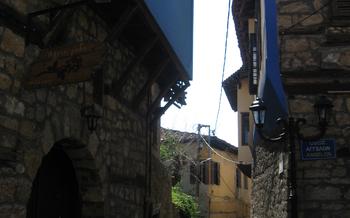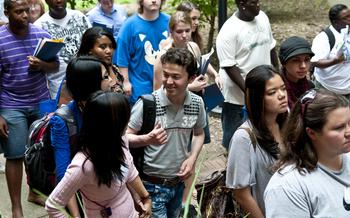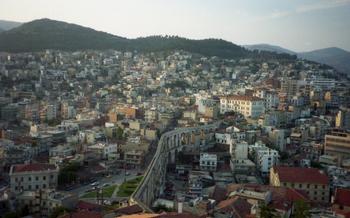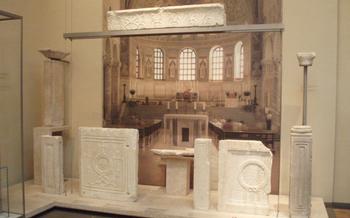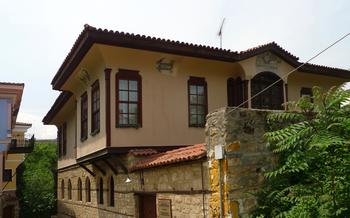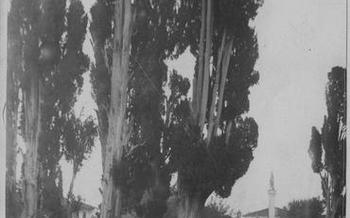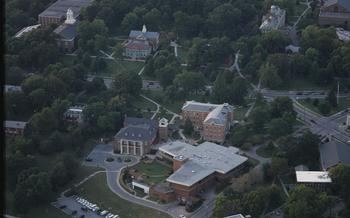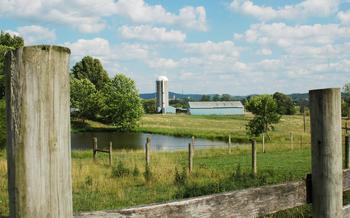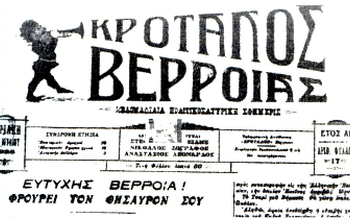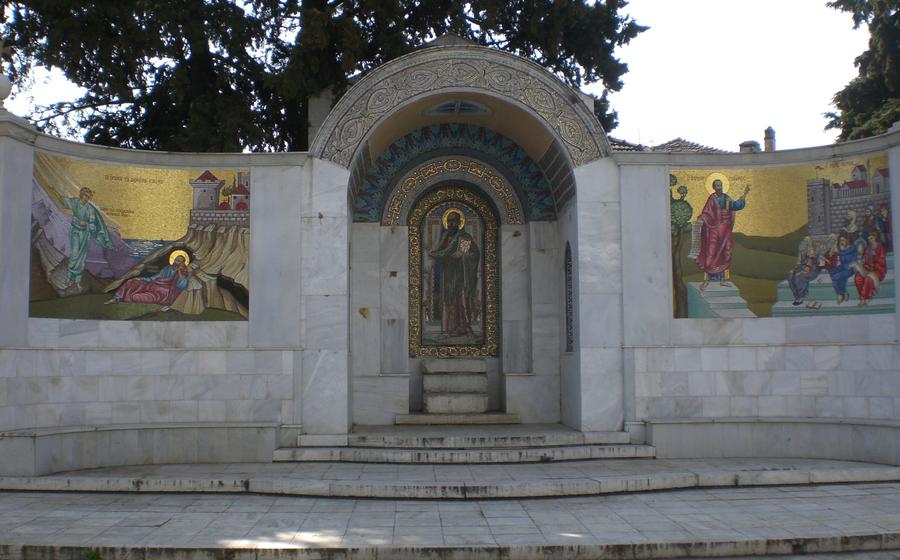
Saint Paul's Altar
- Saint Paul's Altar in Veria: A Historical and Religious Landmark
- Veria's Connection to Saint Paul: A City Transformed
- Exploring the Altar Complex: A Journey Through Time
- The Vibrant City of Veria: A Cultural Tapestry
- Uncovering the Secrets of the Altar: A Deeper Dive
- A Spiritual Retreat: Finding Solace at the Altar
- Saint Paul's Influence on Veria: A Lasting Impact
- The Altar's Place in Christian History: A Global Perspective
- Veria's Culinary Delights: A Taste of Tradition
- Accommodation Options in Veria: A Range of Choices
- Getting Around Veria: A Guide for Travelers
- Must-See Attractions in Veria: Beyond the Altar
- Tips for Planning Your Visit: Practical Considerations
- Insider Tip: Explore the Natural Beauty of Veria
Saint Paul's Altar in Veria: A Historical and Religious Landmark
In the heart of Veria, a city steeped in history and religious significance, lies the revered Saint Paul's Altar, a testament to the apostle's profound impact on the region. This ancient altar, believed to date back to the 5th century AD, stands as a symbol of faith and devotion, attracting pilgrims and history enthusiasts alike.
The altar's architectural design is a blend of simplicity and elegance, featuring a rectangular stone base adorned with intricate carvings. Its central position within the city, near the site where Saint Paul is said to have preached, underscores its importance as a sacred site for the Christian community.
For centuries, the altar has been a place of worship and contemplation, revered by believers seeking solace and spiritual guidance. Its enduring presence serves as a reminder of Saint Paul's transformative influence on Veria, transforming it into a vibrant center of Christianity.
Personal Anecdote
During my visit to Veria, I had the privilege of witnessing the altar's profound impact firsthand. As I stood before this ancient relic, I felt a sense of awe and reverence wash over me. The palpable energy emanating from the site transported me back in time, allowing me to envision Saint Paul's powerful presence and the transformative effect of his teachings.
Veria's Connection to Saint Paul: A City Transformed
The arrival of Saint Paul in Veria marked a pivotal chapter in the city's history, transforming it into a vibrant center of Christianity. His presence left an indelible imprint on the local population, shaping their beliefs and practices. As Saint Paul preached the gospel, the seeds of faith were sown, taking root and flourishing among the receptive hearts of the Verians.
One such convert was Jason, a prominent citizen of Veria, who welcomed Saint Paul and his companions into his home, offering them shelter and hospitality. Through Saint Paul's teachings, Jason and his household embraced the new faith, becoming ardent followers of Christ. The apostle's influence extended beyond Jason's household, captivating the minds and hearts of many Verians, who were drawn to his message of hope and salvation.
As the Christian community in Veria grew, Saint Paul's presence became a beacon of light, attracting believers from neighboring regions. The city transformed into a hub of religious activity, with the establishment of churches and the spread of Christianity throughout the surrounding areas. Saint Paul's legacy in Veria remains palpable, with the city proudly embracing its Christian heritage and the enduring impact of the apostle's teachings.
Exploring the Altar Complex: A Journey Through Time
The altar's location is significant as it stands on the site where Saint Paul is believed to have preached to the people of Veria. The altar itself is a remarkable example of Byzantine architecture, featuring intricate carvings and mosaics that depict scenes from the life of Saint Paul. Its construction showcases the skill and artistry of the Byzantine craftsmen who built it. Archaeological excavations around the altar have revealed ancient artifacts, including pottery fragments and coins, providing insights into the history and daily life of the people who lived here centuries ago. The aura of the altar is truly captivating, inviting visitors to step back in time and connect with the past.
The Vibrant City of Veria: A Cultural Tapestry
Veria, a city deeply entwined with the legacy of Saint Paul, offers a rich tapestry of cultural experiences that captivate visitors from far and wide. Beyond the sacred significance of the Saint Paul's Altar, Veria boasts a vibrant cultural scene, showcasing its diverse heritage and traditions.
As you stroll through the city's historic streets, you'll encounter numerous landmarks and attractions that tell the story of Veria's rich past. From the imposing walls of the Veria Castle, which once guarded the city, to the intricate mosaics of the Byzantine churches, each site whispers tales of a bygone era.
Veria's cultural scene is alive with music, art, and festivals that celebrate the city's unique identity. Throughout the year, the city hosts a variety of events, including the Veria International Film Festival, which showcases independent films from around the world, and the Veria Summer Festival, which brings together local artists and performers for a vibrant celebration of music, dance, and theater.
I recall one particularly memorable evening when I attended a performance at the historic Veria Municipal Theater. The theater, with its elegant architecture and plush red seats, transported me back in time as I watched a captivating play that brought to life the legends and stories of Veria's past.
Explore the city's museums to delve deeper into its history and cultural heritage. The Veria Archaeological Museum houses a fascinating collection of artifacts that tell the story of the city's ancient past, from prehistoric times to the Roman and Byzantine periods. The Byzantine Museum of Veria showcases the city's rich artistic heritage, with stunning icons, mosaics, and frescoes that offer a glimpse into the Byzantine Empire's golden age.
Whether you're a history buff, an art enthusiast, or simply a traveler seeking a vibrant cultural experience, Veria offers an array of attractions and events that will captivate and inspire you. As you explore this remarkable city, you'll discover a place where history, culture, and tradition come together to create a truly unforgettable experience.
Uncovering the Secrets of the Altar: A Deeper Dive
The Saint Paul's Altar is not just a historical and religious landmark; it is also a treasure trove of symbolism and iconography. The intricate carvings and motifs on the altar depict scenes from the Bible, illustrating the life and teachings of Jesus Christ. These intricate details provide a deeper insight into the beliefs and practices of the early Christian community in Veria.
The altar also plays a significant role in religious ceremonies and traditions. It serves as a focal point for prayers, rituals, and other sacred practices. The altar's symbolism and iconography come alive during these ceremonies, inviting worshippers to connect with their faith on a deeper level.
Over the centuries, stories and legends have been woven around the Saint Paul's Altar. Some believe that the altar possesses miraculous powers, while others claim to have witnessed visions and apparitions at the site. These stories add to the mystique and allure of the altar, drawing pilgrims and visitors from all over the world.
Personally, I was struck by the spiritual significance of the Saint Paul's Altar. As I stood before it, I felt a sense of awe and reverence. The altar seemed to radiate a sense of peace and serenity, inviting me to reflect on my own faith and beliefs. It was a truly profound and moving experience that left a lasting impression on me.
A Spiritual Retreat: Finding Solace at the Altar
The Saint Paul's Altar in Veria is not just a historical and religious landmark; it is also a place of profound spiritual significance, attracting pilgrims and visitors seeking solace and connection with their faith. The altar exudes an aura of peace and tranquility, inviting visitors to pause, reflect, and find respite from the bustling world outside.
In the serene atmosphere of the altar, one can indulge in deep contemplation, seeking answers to life's questions or simply finding comfort in the presence of the divine. The altar serves as a sanctuary, a place where individuals can reconnect with their spiritual selves and find solace amidst life's challenges.
Whether you are a devout Christian seeking a deeper connection with your faith or simply an individual searching for inner peace and self-discovery, the Saint Paul's Altar in Veria offers a unique and transformative experience. It is a place where the spiritual and the historical intertwine, creating a profound and lasting impact on visitors.
Personal Anecdote:
During my visit to the Saint Paul's Altar, I was struck by the sense of tranquility that enveloped the site. As I sat in silence, contemplating the altar's history and significance, I felt a deep sense of peace wash over me. It was a moment of profound reflection and spiritual connection that I will cherish forever.
Saint Paul's Influence on Veria: A Lasting Impact
Saint Paul's arrival in Veria marked a pivotal moment in the city's history, heralding a profound transformation that would shape its identity for centuries to come. Under his guidance, the seeds of Christianity were sown, taking root and flourishing in the hearts of the local population. The establishment of churches and monasteries across Veria and the surrounding region stands as a testament to the enduring legacy of Saint Paul's teachings. His influence extended far beyond the city walls, as his tireless efforts and unwavering faith played a pivotal role in spreading the message of Christianity throughout the wider region, leaving an indelible mark on the religious and cultural landscape.
In Veria, Saint Paul's influence is palpable, deeply woven into the fabric of the city's identity. The churches and monasteries that dot the cityscape, each possessing its own unique charm and historical significance, serve as living reminders of his transformative impact. The Church of Panagia Trikala, with its remarkable frescoes depicting scenes from the life of Christ, and the Monastery of Panagia Dovra, perched majestically atop a hill overlooking the city, are just a few examples of the architectural treasures that bear witness to Saint Paul's enduring presence.
The legacy of Saint Paul is not merely confined to the realm of physical structures; it permeates the very soul of Veria. The spirit of community, compassion, and faith that he instilled in the hearts of the people continues to resonate throughout the city, shaping the values and beliefs of its inhabitants. Saint Paul's teachings have indelibly transformed Veria into a vibrant center of Christianity, a testament to the enduring power of his influence.
The Altar's Place in Christian History: A Global Perspective
Saint Paul's Altar in Veria holds immense significance not only within the city but also in the broader context of Christian history. It represents a tangible connection to the Apostle Paul's missionary journeys and the spread of Christianity throughout the Roman Empire. The altar stands as a symbol of faith and devotion, serving as a reminder of the profound impact of Paul's teachings and the establishment of early Christian communities.
Throughout the centuries, the altar has played a pivotal role in shaping Christian traditions and practices. It has been a site of worship, prayer, and pilgrimage, attracting believers from around the world. The altar's enduring presence and symbolic importance have contributed to its recognition as a sacred and revered site within the Christian world.
Personally, I have witnessed the altar's global influence during my travels to other Christian destinations. In Rome, I encountered pilgrims from various countries who had come to visit the sites associated with Saint Paul's ministry. In Jerusalem, I marveled at the devotion of worshippers at the Church of the Holy Sepulcher, where tradition holds that Jesus Christ was crucified and resurrected. These experiences deepened my understanding of the altar's significance as a symbol of a shared faith that transcends borders and unites believers across cultures.
Veria's Culinary Delights: A Taste of Tradition
Veria's culinary scene is a tapestry of flavors that reflects the city's rich history and cultural influences. From traditional Greek dishes to modern culinary creations, there's something to satisfy every palate.
Must-try local specialties include bougatsa, a flaky pastry filled with sweet or savory fillings, and spoon sweets, a variety of fruit preserves served with yogurt or ice cream. For a taste of traditional Greek cuisine, indulge in souvlaki, grilled meat skewers, or moussaka, a hearty casserole made with eggplant, potatoes, and minced meat.
Veria's location at the crossroads of trade routes has influenced its cuisine, resulting in unique dishes like sarma, stuffed vine leaves, and dolmades, stuffed peppers or tomatoes. The city's proximity to the sea brings fresh seafood to the table, with dishes like grilled octopus and seafood risotto being local favorites.
To experience Veria's culinary delights, venture into the city's vibrant markets, where you can shop for fresh produce, spices, and local delicacies. Don't miss the opportunity to savor traditional Greek coffee at a local kafeneion (coffee shop) or indulge in a leisurely meal at one of the city's many tavernas, where you can enjoy delicious food and warm hospitality.
Accommodation Options in Veria: A Range of Choices
Veria offers a diverse range of accommodation options to suit the needs and budgets of every traveler. Whether you prefer the comfort of a luxury hotel, the charm of a traditional guesthouse, or the affordability of a hostel, you'll find plenty of choices to make your stay comfortable.
For those seeking a luxurious experience, the Veria Hotel offers elegant rooms with stunning views of the city. The hotel's amenities include a rooftop pool, a spa, and a fitness center. For a more intimate experience, the Archontiko Veria is a charming guesthouse housed in a historic building. The guesthouse offers cozy rooms with traditional décor and a warm, welcoming atmosphere.
If you're on a budget, there are several affordable options available. The Veria Youth Hostel offers basic but comfortable accommodations in a friendly and social environment. The hostel is located in the heart of the city, making it easy to explore the main attractions on foot.
No matter your budget or preferences, you're sure to find the perfect place to stay in Veria. I recommend booking your accommodation in advance, especially during the peak tourist season, to ensure you get the best deals and availability.
Getting Around Veria: A Guide for Travelers
Veria offers a convenient public transportation system, making it easy to navigate the city. Buses and taxis are readily available, connecting different parts of the city and its surroundings. The central bus station is conveniently located near the city center, providing regular services to regional destinations.
For those who prefer a more independent mode of transportation, renting a car or a bicycle is an excellent option. This allows the freedom to explore Veria and its surrounding areas at your own pace. Several rental agencies are located throughout the city, offering a range of vehicles to suit different needs and budgets.
Veria is also a walkable city, with many of its main attractions located within easy reach of each other. Strolling through the city's streets is a delightful way to soak in its charm and discover hidden gems. The well-maintained sidewalks and pedestrian zones make walking a safe and enjoyable experience.
Personal Anecdote:
During my visit to Veria, I opted to explore the city on foot. I found it to be a fantastic way to appreciate its rich history and architecture. The compact city center allowed me to easily navigate the streets and stumble upon charming cafes, local shops, and historical landmarks. The locals were incredibly friendly and helpful, providing directions and recommendations whenever I needed them.
Must-See Attractions in Veria: Beyond the Altar
While the Saint Paul's Altar is undoubtedly a highlight, Veria offers a wealth of other attractions that showcase its rich history and vibrant culture. A visit to the Archaeological Museum of Veria is a must for history buffs, as it houses a fascinating collection of artifacts from the city's past, including ancient sculptures, pottery, and coins. The Byzantine Museum of Veria, on the other hand, offers a glimpse into the city's Byzantine heritage, with its collection of icons, manuscripts, and frescoes.
For those interested in architecture, the Veria City Hall is a stunning example of neoclassical design, while the picturesque Old Town, with its narrow cobbled streets and traditional houses, offers a glimpse into the city's past.
In my own exploration of Veria, I stumbled upon a hidden gem – the Veria Waterfalls, located just a short walk from the city center. The cascading waterfalls, surrounded by lush greenery, were a delightful surprise and offered a tranquil escape from the hustle and bustle of the city.
Whether you're a history enthusiast, an architecture buff, or simply looking for a unique and authentic experience, Veria has something to offer every traveler. So, while the Saint Paul's Altar is a must-see, be sure to explore the city's other treasures as well – you won't be disappointed.
Tips for Planning Your Visit: Practical Considerations
When planning your trip to Veria, consider the best time of year to visit. Spring and fall offer pleasant weather for exploring the city and its surroundings. Remember to pack comfortable shoes, as you'll be doing a lot of walking on cobblestone streets. The local currency is the euro, so be sure to exchange your money before you arrive.
Veria is a welcoming and safe city, but it's always a good idea to be mindful of your belongings. Respect local customs by dressing modestly when visiting religious sites.
To make the most of your trip, plan your itinerary in advance. Decide which attractions you want to see and how much time you want to spend at each. Don't forget to factor in time for wandering the streets and soaking up the city's atmosphere.
Here's a personal anecdote to illustrate the importance of planning: On my first trip to Veria, I didn't do enough research and ended up missing some of the city's most iconic landmarks. This time, I came prepared with a list of must-see attractions and made sure to allocate enough time to explore them all.
Insider Tip: Explore the Natural Beauty of Veria
Veria is not only a treasure trove of historical and religious landmarks but also a gateway to breathtaking natural wonders. The majestic Vermio Mountains, with their verdant slopes and challenging hiking trails, beckon outdoor enthusiasts. As you trek through the forests, you'll be rewarded with panoramic views of the city and the surrounding countryside.
Nestled amidst the mountains are picturesque villages that offer a glimpse into traditional Greek life. Each village has its own unique charm, from the cobblestone streets of Xiropotamos to the cascading waterfalls of Loutraki. Take a leisurely drive or embark on a scenic bike ride to discover these hidden gems.
For those who prefer a more relaxing experience, a day trip to the nearby Edessa Waterfalls is a must. Marvel at the cascading waters as they plunge into the lush green gorge, creating a mesmerizing spectacle. Don't forget to visit the nearby Pozar Thermal Baths, where you can soak in the warm, mineral-rich waters and rejuvenate your body and soul.
My personal anecdote:
During my stay in Veria, I decided to venture beyond the city and explore the surrounding natural beauty. I rented a mountain bike and set off on a thrilling journey through the Vermio Mountains. The challenging climbs and exhilarating descents were well worth the effort, as I was rewarded with breathtaking views of the city and the surrounding countryside.
As I pedaled through the forests, I couldn't help but feel a sense of peace and tranquility. The fresh mountain air invigorated my senses, and the only sounds were the birds singing and the wind rustling through the trees. It was the perfect escape from the hustle and bustle of city life.
